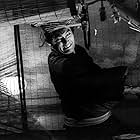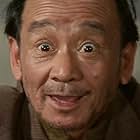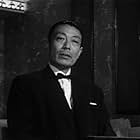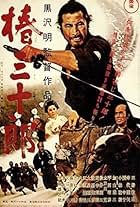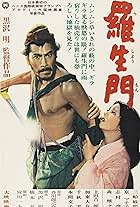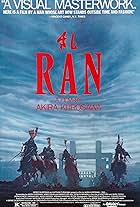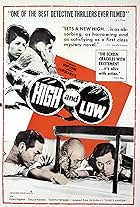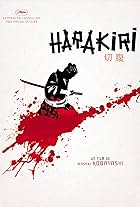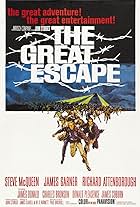AVALIAÇÃO DA IMDb
8,2/10
136 mil
SUA AVALIAÇÃO
Um astuto ronin chega a uma cidade dividida por duas quadrilhas criminosas e decide se confrontar para libertar a cidade.Um astuto ronin chega a uma cidade dividida por duas quadrilhas criminosas e decide se confrontar para libertar a cidade.Um astuto ronin chega a uma cidade dividida por duas quadrilhas criminosas e decide se confrontar para libertar a cidade.
- Indicado a 1 Oscar
- 5 vitórias e 2 indicações no total
Enredo
Você sabia?
- CuriosidadesAkira Kurosawa told Toshirô Mifune that his character was like a wolf or a dog and told Tatsuya Nakadai that his character was like a snake. Inspired by this direction, Mifune came up with Sanjuro's trademark shoulder twitch, similar to the way a dog or wolf tries to get off fleas.
- Erros de gravaçãoIn the initial fight scene, The Samurai cuts the first two adversaries in the mid-section, then slices the last man's arm off. That last man is first seen from behind holding the sword in his right arm above his head, but the arm holding the sword shown moments later is a left arm.
- Versões alternativasThe initial US release ran only 75 minutes, 35 minutes shorter than the original version at 110 minutes.
- ConexõesFeatured in 62nd Annual Academy Awards (1990)
Avaliação em destaque
After a string of classic masterpieces, Kurosawa confronted his influences head-on. Throwing John Ford's Western aesthetics into a blender and painting them pitch black. The results are Yojimbo and its legacy.
Yojimbo ("the bodyguard") is the tale of a flea-ridden wandering swordsman, Sanjuro (Toshiro Mifune, in his finest performance). He arrives at a gang-war ravaged town and starts hiring himself out to both sides, playing them off against another, in order to wipe all the scum out. Sound familiar?
Even though Yojimbo the film is a thrilling ride and very funny dark comedy, it is hard to imagine what a bombshell this was for audiences at the time of its release. It is as far removed as can be from the then squeaky-clean aesthetic of samurai films: you can almost smell the sweat and the grime of the sordid town and characters. The action is fast and furious, enhanced by Kurosawa's deft use of telephoto lenses and Masaru Sato's avant-garde score. With all that, Yojimbo was a massive kick in the pants of a fossilized genre.
It exploded beyond the confines of its own country and genre, forever influencing the very Westerns that had inspired it, particularly a new wave out of Spain and Italy at the time. One Sergio Leone copy/pasted the whole plot into his own revisionist Western and gave us the Dollars trilogy. The slightest of Spaghetti Western enthusiasts owes Kurosawa a debt of gratitude.
As with all truly great work, its greatness exists even devoid of context, and for all the historical precedents it set, all Kurosawa wanted to make was an entertaining film. That he bloody well succeeded is the least you can say about Yojimbo.
Yojimbo ("the bodyguard") is the tale of a flea-ridden wandering swordsman, Sanjuro (Toshiro Mifune, in his finest performance). He arrives at a gang-war ravaged town and starts hiring himself out to both sides, playing them off against another, in order to wipe all the scum out. Sound familiar?
Even though Yojimbo the film is a thrilling ride and very funny dark comedy, it is hard to imagine what a bombshell this was for audiences at the time of its release. It is as far removed as can be from the then squeaky-clean aesthetic of samurai films: you can almost smell the sweat and the grime of the sordid town and characters. The action is fast and furious, enhanced by Kurosawa's deft use of telephoto lenses and Masaru Sato's avant-garde score. With all that, Yojimbo was a massive kick in the pants of a fossilized genre.
It exploded beyond the confines of its own country and genre, forever influencing the very Westerns that had inspired it, particularly a new wave out of Spain and Italy at the time. One Sergio Leone copy/pasted the whole plot into his own revisionist Western and gave us the Dollars trilogy. The slightest of Spaghetti Western enthusiasts owes Kurosawa a debt of gratitude.
As with all truly great work, its greatness exists even devoid of context, and for all the historical precedents it set, all Kurosawa wanted to make was an entertaining film. That he bloody well succeeded is the least you can say about Yojimbo.
- OttoVonB
- 16 de set. de 2002
- Link permanente
Principais escolhas
Faça login para avaliar e ver a lista de recomendações personalizadas
Detalhes
Bilheteria
- Faturamento bruto nos EUA e Canadá
- US$ 46.808
- Fim de semana de estreia nos EUA e Canadá
- US$ 15.942
- 28 de jul. de 2002
- Faturamento bruto mundial
- US$ 67.653
- Tempo de duração1 hora 50 minutos
- Cor
- Proporção
- 2.35 : 1
Contribua para esta página
Sugerir uma alteração ou adicionar conteúdo ausente

Principal brecha
By what name was Yojimbo, o Guarda-Costas (1961) officially released in India in Hindi?
Responda











